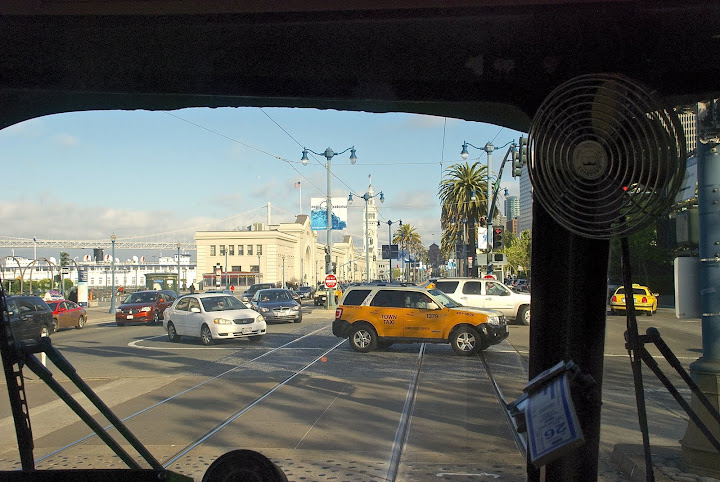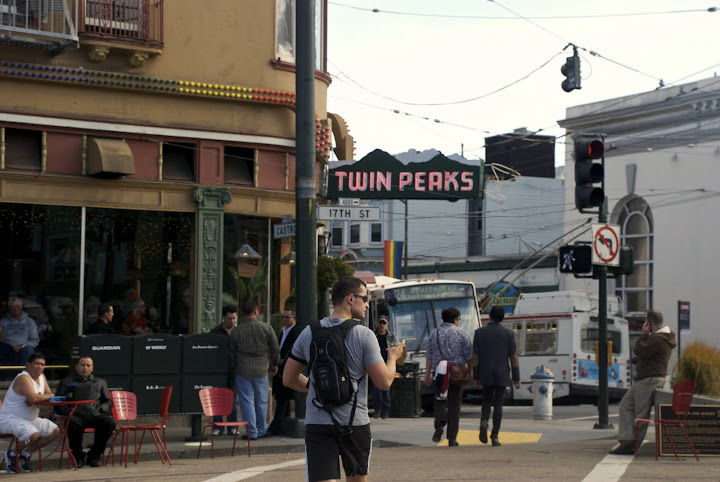My first taste of reverse culture shock was on the BART from San Francisco International to Mission Ave. I looked around the subway car and realized couples surrounded me; one was kissing, not so casually. Another sitting so close I couldn’t have squeezed a quarter between them, and one was in deep conversation about babies.
Suddenly, the half empty subway car felt extremely claustrophobic.
I had just landed after six months in rural, Northeast Thailand where one could never match a married couple in public because they rarely sit or talk to each other, let alone touch. I was so taken back by the canoodling lovers – and that I actually understood everything they were saying – in San Francisco that I missed my subway stop. I exited and made my way to the corner where I was faced with the decision to walk several blocks or hail a cab.
With nearly 30 pounds strapped to my back, another 20 on my chest, a camera bag and a rolling duffle weighing in at exactly 50 pounds, I walked to the nearest intersection and quickly learned that I was standing in the midst of a popular hang out for the city’s homeless and eccentric. For the first time since initially packing my bags, I was afraid I might not make it back to Oregon with all of them.
I opted for a taxi.
After a significant amount of time in cities such as Siem Reap, Cambodia; Hanoi, Vietnam; and Bangkok, Thailand, where one often wishes the respective tuk-tuks, motorcycle taxis and metered cars would simply disappear, or at least stop begging for business, I was dumbfounded at the amount of time that passed waiting for a taxi in this famed U.S. dwelling. After ten minutes, I gave up and began walking up the hill in hopes of stopping a cab on the way.
In the time it took me to crawl three blocks, two empty taxis passed by, pretending not to see me flagging them down, and one pulled over to kindly explain he couldn’t take me because it was out of his way. Really? If I counted right, it was something like five more blocks. And wait a minute. Aren’t you a taxi driver?

Finally, an unused and available cab stopped. He watched me lift my heavy bags into the back seat as I silently wished I could turn around, run back to the airport and beg the pilot to take me back to the land of eager taxi drivers willing to carry my belongings and then load them up, all with a smile and for a meager $4.
When I arrived at my destination – the apartment of a close friend I hadn’t seen in over a year – I was locked out. I made my way to the nearest coffee shop, ordered an Americano and powered on my iPad to look at pictures of my life over the previous eight months. I couldn’t help asking myself over and over again: Why did I come back?

Luckily, it was my first time in San Francisco so at least it felt like I was still traveling – learning and experiencing new things, people, and places each day in the company of a well-traveled friend who understood what I was feeling. I thought once I was finally home amongst family, everything would be better, that these feelings of being displaced would dissipate.
I was wrong.
Sure, parts of being home were better, like the ability to drive myself around, and catch up on things and with people I’d missed, but it was also worse.
After living abroad for an extended period of time, it’s hard to imagine that life back home has gone on without much change. It’s easy to forget that all of the things a traveler can squeeze into six months or a year can often make it feel like several years, and we expect things to have changed when we return.
They haven’t.
And because not much has changed in their lives, it’s hard for them to imagine how much has changed in ours. The fact that everything we’ve done while abroad has been an adventure, even grocery shopping and going to the bank are often not simple endeavors, is sometimes incomprehensible to the inexperienced.
As a traveler fresh back, we expect people to be curious about what it is we’ve been through, to want to hear every story, every comparison, but the truth is they don’t. Not because they don’t care, but because they don’t understand, which also means they don’t know the right questions to ask anyway.
Unless someone has lived in a foreign country, they have no idea what it’s like to return. I found solace in those who had, and learned they are the ones whose first question is always, “How are you adjusting to being back?” or “Is it still weird for you?”
Without having to explain myself, because I didn’t need to, they knew what I was going through. They know reverse culture shock is more of a strange feeling that overcomes us than any particular thing that plagues us. They know it’s more than a desire to go back fighting against a will to be home. They know there are no words, should I try to explain what this feeling that engulfed me was, and they didn’t ask, because they knew all I needed was for someone to understand. “It will get better,” they would say. “Just give it time.”
On that initial return home, I gave it about two months before I booked a ticket to China and headed off on what turned into another nine-month adventure. My reverse culture shock had eased slightly in that time, but my heart was still in Asia and I felt I needed to retrieve it before I could finally succumb to the questions and decisions that come with life back home. What I learned, among countless other things, is that the initial shock does get easier the second time.

After we experience it once, we know what to anticipate. We no longer hold those same expectations of people back home, and we find that once we drop the ego that naturally follows the journeys we’ve been fortunate to have, we’re finally able to make the most of our time back home, and fully enjoy being with the ones we love.
We learn to trust that the others were right and, eventually, the over-touchy couples and lack of public transportation will be our norm again…if we can manage to stay home long enough to find out.
Jessica J. Hill, the Teach Abroad Editor for Wandering Educators, is an Oregon native currently working in Thailand. She writes about traveling, teaching abroad, and coming home. Find more of her stories here: http://www.missadventuretravel.com/
